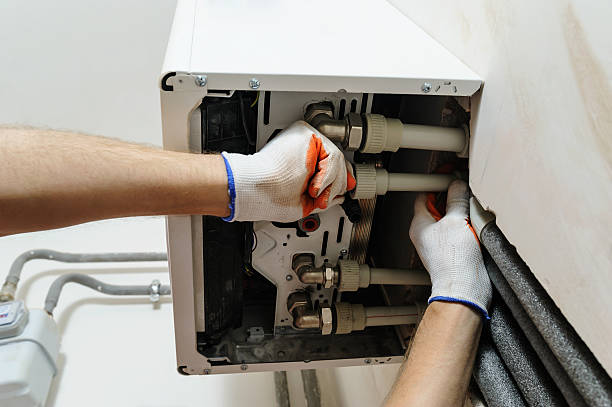Water Heater Replacement in Tampa, FL

When your water heater fails in Tampa, professional water heater replacement is essential to restore comfort and efficiency. This guide covers key indicators it's time for a replacement, such as age, rust, and leaks. Explore your options, including traditional storage tank and modern tankless units, understanding their advantages and considerations. Learn about the comprehensive installation process, from sizing and removal to precise installation and testing, ensuring a safe and reliable hot water supply for your home.

Professional Water Heater Replacement in Tampa
A reliable supply of hot water is an essential part of modern life, integral to everything from a morning shower to washing dishes and doing laundry. When your water heater begins to fail, it can disrupt your entire household routine and cause significant stress. For homeowners in Tampa, facing a failing water heater means seeking a swift, professional, and lasting solution. A replacement is not just about restoring comfort; it's an opportunity to upgrade your home’s efficiency, reliability, and overall value. Understanding when it's time to replace your unit, what your options are, and what the installation process entails is key to making an informed decision for your property.
Key Indicators That It's Time for a Replacement
While some water heater issues can be resolved with a repair, many symptoms point toward the end of the unit's lifespan, making replacement the more sensible and cost-effective option. Recognizing these signs can help you plan for a replacement before a complete system failure leaves you in a cold-water emergency.
- Age of the Unit: A conventional storage-tank water heater typically has a service life of 8 to 12 years. If your unit is approaching or has surpassed this age range, it's operating on borrowed time. Proactively replacing an aging unit can prevent the catastrophic water damage that often accompanies a tank rupture.
- Rusty or Discolored Water: If you notice rusty or muddy water coming exclusively from your hot water taps, it's a strong indication that the inside of your water heater's tank is corroding. This internal decay is irreversible and a clear sign that the tank's integrity is compromised.
- Strange Noises: As water heaters age, sediment builds up at the bottom of the tank. This layer of mineral deposits can harden, causing the unit to make rumbling, popping, or banging noises as it heats water. These sounds indicate inefficiency and place significant stress on the tank, often preceding a leak.
- Visible Leaks or Moisture: Any amount of water pooling around the base of your water heater is a serious concern. While a leak could originate from a fitting, it often signals a fracture in the internal tank itself, which necessitates a full replacement.
- Inconsistent Water Temperature: A unit that struggles to produce enough hot water or fails to maintain a consistent temperature is a common sign of failure. This could be due to a faulty heating element or, more likely, a system that is too old or sediment-filled to function efficiently.
- Frequent Repairs: If you find yourself scheduling repairs for your water heater more than once a year, the cumulative cost and inconvenience often outweigh the expense of a new, reliable unit.
Exploring Your Water Heater Replacement Options
When you decide to replace your water heater, you have the chance to choose a system that better fits your family’s needs and energy goals. The two primary types of water heaters offer distinct advantages for Tampa homes.
Traditional Storage Tank Water Heaters
This is the most common type of water heater, consisting of an insulated tank that holds and continually heats a reserve of water.
- How They Work: A heating mechanism (either an electric element or a gas burner) keeps the water in the tank at a set temperature, so it’s ready for immediate use. When you turn on a hot water tap, hot water is drawn from the top of the tank while cold water refills the bottom to be heated.
- Advantages: The primary benefits are a lower initial purchase price and a familiar, straightforward installation process. They are a reliable and proven technology.
- Considerations: Because they constantly heat a large volume of water, they experience "standby heat loss," which can lead to higher energy consumption. The amount of hot water is limited to the tank's capacity, which can be a drawback for larger families.
Tankless Water Heaters (On-Demand)
Tankless water heaters are a modern, energy-efficient alternative that has become increasingly popular.
- How They Work: Instead of storing water, these units use powerful gas burners or electric elements to heat water instantly as it flows through the device. They only operate when there is a demand for hot water.
- Advantages: The most significant benefit is an endless supply of hot water. They are also highly energy-efficient since they eliminate standby heat loss, potentially reducing water heating costs. Their compact, wall-mounted design saves valuable floor space, and they typically have a much longer lifespan than tank models, often lasting 20 years or more.
- Considerations: The upfront investment for a tankless unit is higher than for a traditional tank. The installation can also be more complex, sometimes requiring upgrades to your home's gas line or electrical panel to meet its power demands.
The Professional Water Heater Installation Process
A proper installation is just as important as the quality of the unit you choose. Our methodical approach ensures your new water heater is installed safely, efficiently, and in full compliance with all Tampa building codes for lasting performance.
- System Sizing and Selection: We begin by evaluating your household’s hot water usage, family size, and available space. This allows us to help you select the correctly sized tank or tankless model that will meet your demands without wasting energy.
- Safe Removal of the Old Unit: Our technicians will first shut off the water, gas, or electricity to the old heater. The tank is then carefully drained, disconnected, and safely removed from your property for proper disposal.
- Site Preparation: We inspect the installation area to ensure it is clean, stable, and ready for the new unit. This may involve cleaning the space, checking for proper ventilation, and making any necessary adjustments to the plumbing or electrical connections.
- Precise New Unit Installation: The new water heater is carefully positioned and securely connected to the water supply lines. For gas models, we ensure a secure gas line connection and proper venting to the outdoors. For electric models, we handle all wiring safely. All connections are meticulously checked for integrity.
- System Commissioning and Testing: Once installed, we fill the new unit, purge all air from the lines, and activate the system. We perform a comprehensive series of tests to verify correct operation, check for any leaks, and calibrate the thermostat to your desired temperature for optimal performance and safety.
- Final Walkthrough and Cleanup: We believe in leaving your home as clean as we found it. After the installation is complete, we clean the work area thoroughly. We then walk you through the operation of your new water heater, explaining any maintenance needs and answering all your questions to ensure you are comfortable with your new system.










